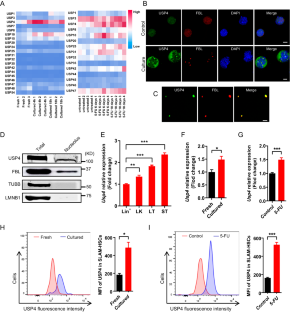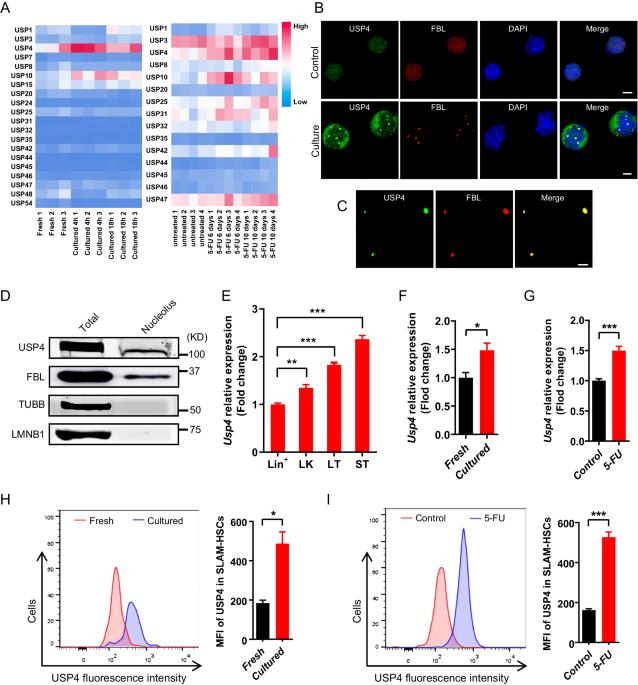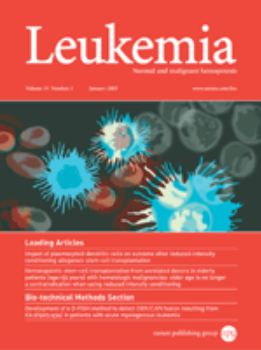USP4 regulates ribosome biogenesis and protein synthesis for hematopoietic stem cell regeneration and leukemia progression
IF 12.8
1区 医学
Q1 HEMATOLOGY
引用次数: 0
Abstract
Enhanced ribosome biogenesis and protein synthesis are required for cell proliferation. During hematopoietic regeneration, hematopoietic stem cells (HSCs) proliferate rapidly to replenish the hematopoietic system. How HSCs respond and regulate ribosome biogenesis and protein synthesis during regeneration remains unclear. Here, we analyzed the expression of a series of ubiquitin-specific-proteases (USPs) during HSC regeneration. We found USP4 expression is significantly increased in proliferating HSCs. Further functional and mechanistic investigations revealed a crucial regulatory function of USP4 in HSC regeneration and leukemia progression by modulating ribosome biogenesis and protein synthesis. USP4 deubiquitinates and stabilizes PES1 to facilitate ribosome biogenesis and protein synthesis in proliferative HSCs and leukemic cells. Usp4 deletion significantly decreases protein synthesis, proliferation and reconstitution capacity of HSCs. Usp4 inhibition suppresses ribosome biogenesis and proliferation of leukemic cells, and prolongs the survival of AML (Acute myeloid leukemia) mice. These findings provide a new insight into the response mechanism of ribosome biogenesis and protein synthesis in HSCs, and their contribution to leukemia progression.


USP4 调节核糖体生物发生和蛋白质合成,促进造血干细胞再生和白血病进展
细胞增殖需要增强核糖体生物生成和蛋白质合成。在造血再生过程中,造血干细胞(HSCs)迅速增殖以补充造血系统。造血干细胞在再生过程中如何应对和调控核糖体生物发生和蛋白质合成仍不清楚。在这里,我们分析了造血干细胞再生过程中一系列泛素特异性蛋白酶(USP)的表达。我们发现 USP4 在增殖的造血干细胞中表达明显增加。进一步的功能和机理研究发现,USP4 通过调节核糖体生物生成和蛋白质合成,在造血干细胞再生和白血病进展过程中发挥着重要的调控功能。USP4 可去泛素化并稳定 PES1,从而促进增殖性造血干细胞和白血病细胞的核糖体生物发生和蛋白质合成。缺失 Usp4 会明显降低造血干细胞的蛋白质合成、增殖和重组能力。抑制 Usp4 可抑制核糖体生物发生和白血病细胞的增殖,并延长急性髓性白血病(AML)小鼠的存活时间。这些发现为了解造血干细胞核糖体生物发生和蛋白质合成的反应机制及其对白血病进展的贡献提供了新的视角。
本文章由计算机程序翻译,如有差异,请以英文原文为准。
求助全文
约1分钟内获得全文
求助全文
来源期刊

Leukemia
医学-血液学
CiteScore
18.10
自引率
3.50%
发文量
270
审稿时长
3-6 weeks
期刊介绍:
Title: Leukemia
Journal Overview:
Publishes high-quality, peer-reviewed research
Covers all aspects of research and treatment of leukemia and allied diseases
Includes studies of normal hemopoiesis due to comparative relevance
Topics of Interest:
Oncogenes
Growth factors
Stem cells
Leukemia genomics
Cell cycle
Signal transduction
Molecular targets for therapy
And more
Content Types:
Original research articles
Reviews
Letters
Correspondence
Comments elaborating on significant advances and covering topical issues
 求助内容:
求助内容: 应助结果提醒方式:
应助结果提醒方式:


